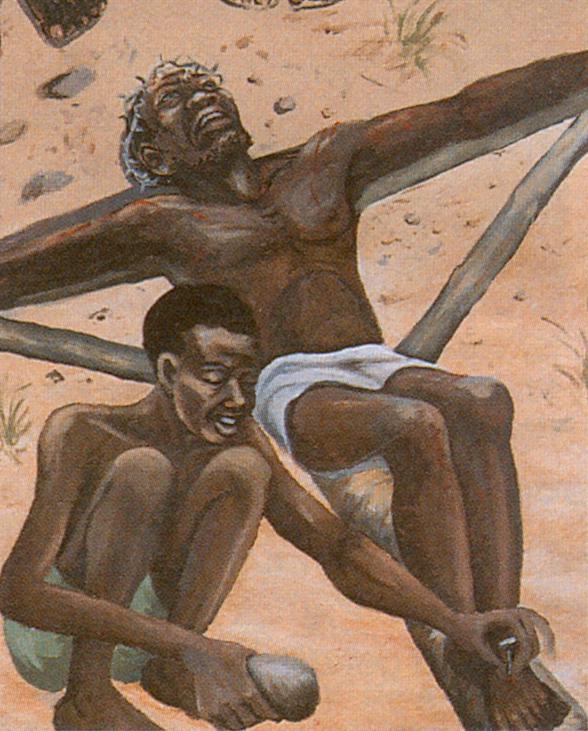The noise is coming out, and if it's not out now
Then tomorrow, tomorrow
They took your life apart and called you failure's art
They were wrong though, they won't know
'Til tomorrow~~Elliott Smith
I hope that
Part 4 persuaded many of my readers (or reconfirmed already held beliefs) about the importance of studying the historical Jesus in correlation with the theological Jesus. My greatest hope in writing--the eschatology of this blog series, if you will--is that the artificial border between those two approaches to Jesus would
lie down together in peace. Theology has nothing to fear from examining history, and history has nothing to fear in doing theology.
I hope this post will draw together some of the threads of earlier posts in its discussion of Jesus' Jewishness. I have already shown the problems with an ahistorical rendering of Jesus' Kingdom preaching in
Part 3. Without a firm historical cornerstone, the theological building crumbles into a heap of Platonic metaphysical speculation about the afterlife. It could be argued, though, that this misunderstanding of "Kingdom" is an isolated example and that the majority of traditional theological reflection would be left unscathed by a closer study of history. I have often heard this objection raised, and I would like to answer it somewhat indirectly.

Of all the things that my Evangelical background did well (yes, there were many things!), making sense of the pre-passion gospel accounts was not amongst them. In short, I was quite clear on why Jesus died ("to forgive sins"), but rather fuzzy on why he lived (other than "to be sinless"). Further, it went as an unspoken assumption that Jesus death could have "worked" regardless of when he lived (period of history) or his ethnic heritage. Thus, if he had been Chinese, lived in the 200's B.C.E, spun pithy aphorisms and died a sacrificial death, it would have been just as well for those who seek "salvation."
I have since come to see such a view of Jesus as shortsighted for a number of reasons. I should be clear at this point, however, that the soteriology of my youth is something I still hold very dear. I still believe deeply and passionately that Jesus died to save sinners. Yet, that description of his mission alone is rendered impotent without the larger story that must accompany it--a story that answers all of the important worldview questions:
who are we,
where are we,
what is wrong and
what is the solution,

(See Wright's
NTPG, 123c). And, though Christians have developed interesting answers to those questions in modern times, I would argue that Jesus' answers to those questions in his own time were very different. Further, we only get a true understanding of the importance of Jesus when we see how his answers to these questions differed from those of his first century contemporaries. I would also argue that if we are to be Biblically faithful, our own answers to those questions must grow organically out of Jesus'.
Who Are We? For a first century Jew, this one was a no-brainer: We are the people of the one true, creator God--the God who made everything. All of us who are Jews by birth belong to a privileged order of God's humanity--the elected. In his wisdom,God has given us the covenant, the law and the temple.
Where Are We? & What Is Wrong? For a first century Jew, these questions were impossible to answer in isolation from one another: Some of us are back in the land that we were promised, but that land no longer looks like the one that we were promised. For starters, we are a vassal state under the crushing imperial power of Rome. Second, because of Roman rule we are taxed beyond the confines of what we can bear. Third, even our house of worship is controlled by the Herods, whom most of us despise. So, to put it bluntly, home isn't right, the power structures aren't right and worship isn't right. To put it even more bluntly:
The exile is still ongoing. For whatever reason, Yahweh still allows this state of affairs to continue in relative silence.
What Is The Solution? It is important to note that there were a number of answers to this question, all of which will necessarily be oversimplified in what follows:
- As a Zealot, I believe that Yahweh has not delivered us from oppression because we have not given him ample opportunity to display his power in battle. Therefore, it is our duty and privilege to provoke the Romans into an armed conflict, trusting that Yahweh will victoriously act on our behalf when we do. My favorite part of scripture is Daniel 7.
- As a Pharisee, I believe that Yahweh has not delivered us from Roman oppression because the sin of the land is so great. The lack of personal commitments to holiness amongst the prostitutes, tax collectors, etc. is to blame for the condition we’re in. Only when Yahweh sees a systemic commitment to piety will he act decisively on our behalf and deliver us from Roman oppression. My favorite part of Scripture is the book of Leviticus.
- As a Sadducee, I believe that we need to accept the present Roman oppression as a consequence of our past sins. Therefore, the wisest course of action is to accept Yahweh's judgment by making the best of the situation--after all, the more that Rome prospers, the more we will prosper along with it. My favorite part of Scripture is Jeremiah 29.
- As an Essene, I believe that everything wrong with the so-called, ‘people of God’ is so bad as to be irreparable. In fact, not all those who call themselves, “Israel” really are the Israel that God has in mind. Therefore, the best we can hope for is to start again--away from all the evil in Jerusalem--by forming a remnant community along the Dead Sea in Qumran. Only in separation and isolation can holiness be achieved. My favorite part of Scripture is Isaiah 10.
However crude and reductionist, I believe this to be a historically accurate sketch of the Jewish worldview matrix into which Jesus stepped. His life, then, is best understood by examining the ways in which he affirmed, modified or opposed the ready made answers to the worldview questions posited by the different Judaisms of his day.
What follows is my understanding of how Jesus would have answered the same four worldview questions if they were posed to him:
 Who Are We? "We"
Who Are We? "We" is a bit of a misnomer, because not everyone who is Jewish by ethnicity is amongst God's elect. As Isaiah prophesied, God has reserved a remnant for himself, and I have come to gather that remnant around me and to define it in relation to myself. The standards by which Israel has typically judged herself a part of the covenant community--Circumcision, Temple and Torah--are no longer reliable as efficacious symbols of corporate identity. God's Israel will be defined as those who love me by keeping my commands.
Where Are We? & What Is Wrong? We are at THE climactic moment in all of history. We are still in exile, and that means each person must make a choice. The first option is for those who insist upon clinging to their own nationalistic aspirations. The result of that choice will be judgment and destruction--it is as foolish a choice as waiting on the shore of the Red Sea as Pharaoh's army approaches. The second choice is to join the remnant by passing through the water--John has already symbolically initiated this by his baptisms in the desert. The result of that choice will be the experience of a new exodus--a new liberation from oppression. Certainly, though, most of ethnic Israel will not accept Yahweh's chosen mode of deliverance--they never do; and this is a symptom of the larger problem. Israel has mistaken her election as a matter of privilege when it was always intended as a matter of responsibility.
What Is The Solution? I am the solution. I am everything that Yahweh wanted Israel to be in the first place. I am the elect one--true Israel--because I have perfectly kept the covenant with Yahweh. I am the 'blessing to the nations of the earth' for through me, Yahweh will finally see his hope for the inclusion of the Gentiles realized. I am the "prophet like Moses" because I have come to lead a new exodus from the present oppression. I am the true temple because true worship of Yahweh happens in and through me.
*****
I suggest that this sketch of Jesus' worldview makes excellent sense of the life he lived--why he taught as he did, why he acted as he did and why he ultimately died as he did. A Jesus who believed and acted in this manner is believably follow-able because he provided a rare and convincing hope to his contemporaries. Further, this Jesus is believably crucifiable from both a Roman and a Jewish perspective. Worldviews do not shift easily, and Jesus' subversion of them would logically be met with fierce resistance from all the world's powers.
Some may object at this point that I still have not displayed any kind of interpretive cash-out for all the historical insight I've provided.
And those people are correct.
Unfortunately, due to the length of this post, those people will have to wait for the next edition. In Part 6 (which, God willing will be far shorter than Part 5) I will give some concrete examples of where the first century Jewish matrix I've sketched has made a difference in my readings of the texts. I felt that it would have been disingenuous to give those examples without first providing a clear foundation.
For those that made it clear to the bottom of this post, I thank you for your time and attention. I look forward to continuing our discussion.
Labels: Surprised By Hope, Theological Musings
 As many of you know, I am working my way toward a Ph.D. in Biblical studies. This involves, amongst other things, a ton of quality time in the library. A lot of the things I read are very good, but the process of winnowing can also be frustrating when the percentage of chaff of is very high. As a tribute to the theological chaff, I am starting a new series on the Speckled Mind called, "Preposterous Theological Statements." This will, I hope, help all of you to share the journey with me and participate in mocking and ridiculing Biblical scholars who have truly missed the point.
As many of you know, I am working my way toward a Ph.D. in Biblical studies. This involves, amongst other things, a ton of quality time in the library. A lot of the things I read are very good, but the process of winnowing can also be frustrating when the percentage of chaff of is very high. As a tribute to the theological chaff, I am starting a new series on the Speckled Mind called, "Preposterous Theological Statements." This will, I hope, help all of you to share the journey with me and participate in mocking and ridiculing Biblical scholars who have truly missed the point. Third, a hypothetical source is clearly NOT a 'document.' To say it is would be like referring to Pegasus as a farm animal. Which gives me an idea...
Third, a hypothetical source is clearly NOT a 'document.' To say it is would be like referring to Pegasus as a farm animal. Which gives me an idea...


























